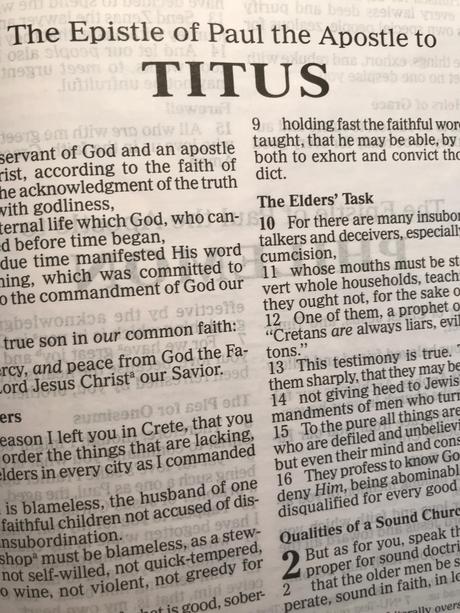Grace Thoughts
Living Christian In ‘This Present World’ (Part 2)

Copyright © 1982 by Thomas Nelson. Used by permission. All rights reserved.
" height="1088" width="816" data-medium-file="https://gracelifethoughts.files.wordpress.com/2020/12/titus-page.jpeg?w=225" data-permalink="https://gracelifethoughts.com/titus-page/" data-image-title="Titus Page" alt="" srcset="https://gracelifethoughts.files.wordpress.com/2020/12/titus-page.jpeg?w=816 816w, https://gracelifethoughts.files.wordpress.com/2020/12/titus-page.jpeg?w=1632 1632w, https://gracelifethoughts.files.wordpress.com/2020/12/titus-page.jpeg?w=113 113w, https://gracelifethoughts.files.wordpress.com/2020/12/titus-page.jpeg?w=225 225w, https://gracelifethoughts.files.wordpress.com/2020/12/titus-page.jpeg?w=768 768w" data-image-meta="{"aperture":"1.8","credit":"","camera":"iPhone 7","caption":"","created_timestamp":"1609338905","copyright":"","focal_length":"3.99","iso":"25","shutter_speed":"0.025","title":"","orientation":"1"}" data-large-file="https://gracelifethoughts.files.wordpress.com/2020/12/titus-page.jpeg?w=616" />Copyright © 1982 by Thomas Nelson. Used by permission. All rights reserved.
How does a Christian live in today’s world? Wherever you live on Planet Earth, being a follower of Jesus Christ is difficult. More so in some places than others, but still difficult.
Jesus said it would be this way. He also gave us hope –
These things I have spoken to you, that in Me you may have peace. In the world you will have tribulation; but be of good cheer, I have overcome the world.
John 16:33
Jesus overcame the world and so can we. How do we do it? That’s the purpose of this Bible study series.
We’ll use Paul’s letter to Titus as a guide to learn how to live Christian in this present world. We invite you to read the introduction for some historical background.
Reading Titus
I’ve been studying the Bible for 50 years and have had the benefit of wonderful mentors and teachers in learning how to “divide” God’s Word “rightly” (2 Timothy 2:15). That means handling and teaching the Word of God correctly (ὀρθοτομέω). It is the most important thing a Christian can do if they want to live Christian in this present world. If we handle the Word of God incorrectly, we will find ourselves failing to understand God’s will for our lives. That can and usually does lead to very bad decisions as followers of Christ.
Titus is a short letter, so I recommend you read it three times through in a word-for-word translation (Formal Equivalence). Examples of those translations are the King James Version, New King James Version, New American Standard Bible, and English Standard Version. You may also want to read Titus two or three times in a thought-for-thought translation (Dynamic Equivalence). Examples of those translations are New International Version and New Living Translation. You may also want to listen to Titus on a Bible app after reading through it to keep your mind fresh to what God is saying to you through His Word. Remember that God’s Word is not just a book. It is THE BOOK. It is God’s Word, inspired by the Holy Spirit who lives in you. As Jesus reminded Satan –
It is written, Man shall not live by bread alone, but by every word that proceeds from the mouth of God.
Matthew 4:4
Allow God’s Word to sink deep into your mind and soul as you listen to His Voice. Reading God’s Word helps deepen your relationship with the God of Creation, which is His purpose for our lives. Just as you would listen closely to someone you loved and admired deeply, so listen to God as He speaks to you through His Word.
Studying Titus
We move from reading Titus to studying Titus. I’ll keep this short, but you’ll find more about Bible study methodology here.
Bible “study” basically means spending time to determine the meaning of what the Bible says. That means understanding what God meant when He inspired prophets and apostles to write His Word. You’ll find hundreds of different interpretations about what Bible verses mean, but there’s only one interpretation I’m interested in and that’s God’s meaning.
Text and context are paramount in studying the Bible. What does each word mean? What do the words of each verse mean? What do the verses mean in context. That process is known as exegesis – reading “out of” the text the author’s meaning and intent. The opposite way of studying the Bible, which I highly recommend against doing, is known as eisegesis – reading “into” the text what the reader/interpreter wants to find. That’s a dishonest and dangerous way of studying the Bible.
Unfortunately, it is the method many Christians use in studying the Bible. How do I know that? By listening to what they believe about the Bible. It’s also the method many Bible teachers and preachers use in studying the Bible. How do I know that? By listening to what they teach and preach and reading their articles and books. It’s one of the reasons that many sermons today are topical (jumping from one verse to another trying to get the Bible to agree with personal, often bad, theology) rather than contextual (verse-by-verse). It’s easier to hide a lack of knowledge and understanding about the true meaning of God’s Word through topical teaching than with contextual teaching.
We will study Titus contextually with an eye on how to live Christian in this present age (αἰῶνι).
… denying ungodliness and worldly lusts, we should live soberly, righteously, and godly in the present age.
Titus 2:12
So, let’s begin our contextual study in Paul’s letter to Titus.
Titus 1:1-4
Paul, a bondservant of God and an apostle of Jesus Christ, according to the faith of God’s elect and the acknowledgment of the truth which accords with godliness, in hope of eternal life which God, who cannot lie, promised before time began, but has in due time manifested His word through preaching, which was committed to me according to the commandment of God our Savior; To Titus, a true son in our common faith: Grace, mercy, and peace from God the Father and the Lord Jesus Christ our Savior.
Paul the Apostle wrote to Titus during a short period of time between two imprisonments in Rome. A date of 63 or 64 AD is a good estimate of when Titus would have received the letter; most likely close to the same time Paul wrote his first letter to Timothy. You may want to read 1 Timothy when you’re finished studying Titus to see the similarities in what Paul wrote to both men.
Paul had been a follower of Jesus Christ for about 30 years by the time he wrote to Titus. Paul was a seasoned apostle with a very special commission directly from Jesus (e.g. Acts 9; Acts 26; Galatians 1; 2 Corinthians 12). He had preached the Gospel across the Roman Empire and spent many years in prison because of his preaching. Paul knew how to live Christian in the world of his day.
Paul was a master theologian, as we will see in our study. However, he was also a humble servant. He called himself “a bondservant” of God. The Greek word is δοῦλος which means “bond-slave” and was a person with no ownership rights of their own. Paul understood that he had been a slave to sin before Jesus called to him on the road to Damascus (Acts 9). Paul knew that Jesus had purchased him with His blood shed on the Cross (Acts 20:28; Revelation 5:9). Notice how he emphasized being God’s slave before mentioning his gift and appointment as an apostle of Jesus Christ. May we also have that same attitude as we serve God with our spiritual gifts.
God’s redemptive plan and its impact on the way the redeemed live in the world is a primary theme in Paul’s letter to Titus, so it’s not surprising that Paul would begin there. Notice in the first few verses how many themes of redemption Paul mentions:
- according to the faith of God’s elect
- and the acknowledgment of the truth which accords with godliness
- in hope of eternal life which God, who cannot lie, promised before time began
- but has in due time manifested His word through preaching
- which was committed to me according to the commandment of God our Savior
Key words concerning redemption include:
- faith (πίστιν – belief, trust, confidence)
- God’s elect (ἐκλεκτῶν Θεοῦ – selected, chosen out of by God)
- acknowledgement of the truth (ἐπίγνωσιν ἀληθείας – recognition, perception of that which is true to fact )
- which accords with godliness (τῆς κατ’ εὐσέβειαν – leads to a life of piety, devotion to God)
- in hope of eternal life (ἐπ’ ἐλπίδι ζωῆς αἰωνίου – in confident expectation of living forever, life unending)
- which God, who cannot lie, promised before time began (ἣν ἐπηγγείλατο ὁ ἀψευδὴς Θεὸς πρὸ χρόνων αιωνιων – which free from falsehood, God declared a promise that is fitting before chronological time, eternal)
- but has in due time manifested His word through preaching (ἐφανέρωσεν δὲ καιροῖς ἰδίοις τὸν λόγον αὐτοῦ ἐν κηρύγματι – revealed, made visible, made clear, now at the opportune time, season, uniquely owned by Him, in the word, speech, in proclamation, preaching)
- which was committed to me according to the commandment of God our Savior (ὃ ἐπιστεύθην ἐγὼ κατ’ ἐπιταγὴν τοῦ Σωτῆρος ἡμῶν Θεοῦ – which was entrusted to me according to the instruction, command, order, of the Savior, Deliverer, of us, God
Paul presents a clear path of how salvation works in the opening verses of Titus. We have God’s selection and the preaching of the Gospel, followed by faith, knowledge and godliness. That’s a pattern of redemption. God provides everything for salvation. He loves, He chooses, He demonstrates grace to those He chooses, He sends His Son to die and rise, He provides the Gospel, He appoints people to preach the Gospel, He instills faith in those He chooses, He gives them knowledge and calls them to live godly in this present world.
One of the people chosen by God to be saved and to preach the Gospel was Titus. Titus had been with Paul almost 20 years by the time he received the apostle’s letter on the island of Crete. Paul had most likely led Titus to believe on Jesus. You can sense Paul’s deep love for Titus in this greeting:
To Titus, a true son in our common faith: Grace, mercy, and peace from God the Father and the Lord Jesus Christ our Savior.
The words “a true son” are γνησίῳ τέκνῳ (genuine, true in origin, child). Titus was a genuine son in “our common faith” (κοινὴν πίστιν – shared belief). You may remember that Paul wrote the Corinthians about Titus stating that “If anyone inquires about Titus, he is my partner and fellow worker concerning you” (2 Corinthians 8:23). Paul did not view himself as being more important than Titus, Timothy or other fellow workers in the preaching of the Gospel. He viewed Titus as a partner (κοινωνὸς – joint-participant, sharer) and fellow worker (συνεργός – together with, helper, associate). Paul had his work to do as an apostle and Titus had his work to do as a missionary evangelist and teaching pastor.
Paul’s instructions to Titus in this letter indicate his high regard for his coworker’s missionary zeal, as well as his considerable abilities to organize local churches for effective and solid Christian ministry. In a day when many Christian institutions have been marred by financial irresponsibility, lack of integrity, division over nonessential issues, and the ever-present threat of false doctrine, Titus serves as a challenging example of a man of character who was consistently available to do God’s work.
Thomas Lea, New American Commentary Vol 34: 1, 2 Timothy, Titus. B&H Publishing Group, 2012
Next Time
We will venture into the reason Paul left Titus on the island of Crete and what we can learn about how we can live Christian in this present world in the next part of our special series.
Scripture taken from the New King James Version®. Copyright © 1982 by Thomas Nelson. Used by permission. All rights reserved.
Copyright © 1990-2021 GraceLife
 Apostle PaulChristianChristianityLiving ChristianTitus
Apostle PaulChristianChristianityLiving ChristianTitus

Published by gracelifethoughts
Founder & Director of GraceLife Ministries View all posts by gracelifethoughts
